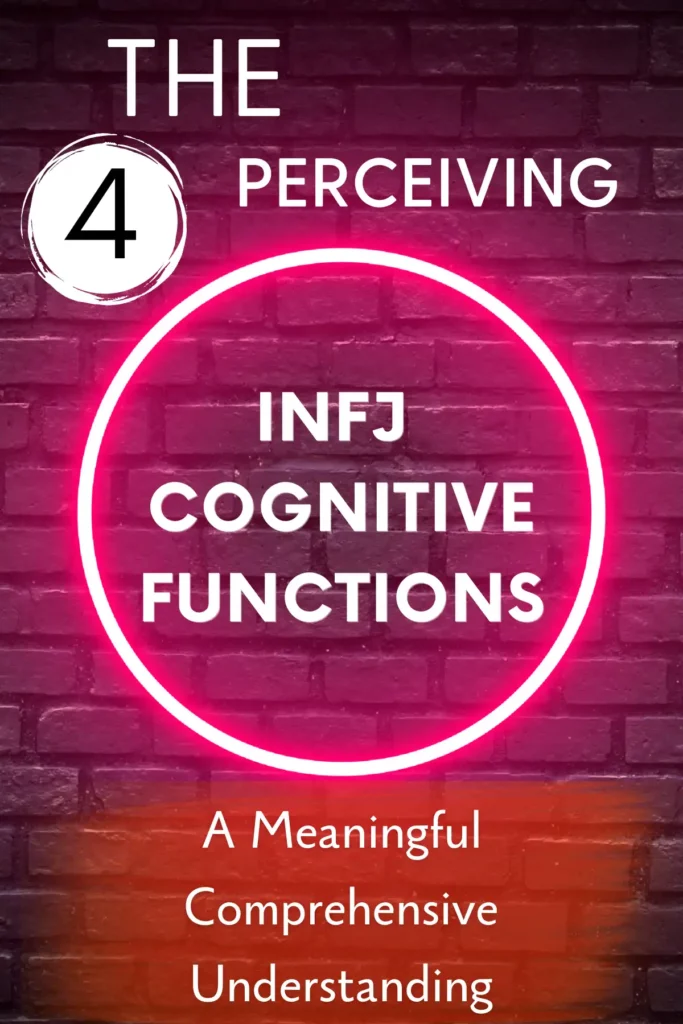Do you want to know what INFJ cognitive functions mean? Do you want to understand the INFJ cognitive functions and how they impact the INFJ personality type? If you’re seeking a meaningful and comprehensive understanding of INFJ cognitive functions, then you have come to the right place.
Before we dive in to understand the importance and relevance of each INFJ cognitive function and its role for the INFJ personality type, let’s briefly discuss how these terms came into existence.
Table of Contents
History behind the origin of Cognitive Functions
The famous Swiss psychiatrist and psychoanalyst Carl Gustav Jung (founder of analytical psychology) formulated the theory behind cognitive functions. Initially, it was known as psychological functions, also known as Jungian functions.
Later, on the foundation work of Carl Jung, Katharine Cook Briggs and her daughter Isabel Briggs Myers introduced the 16 personalities types based on the different arrangements of cognitive functions in each type. They created a questionnaire called the Myers-Briggs Type Indicator (MBTI) to find out the personality type of any individual.
John Beebe, MD, a famous Jungian Typologist, introduced the eight-function model in continuation to the Myers-Briggs personality theory. Through his groundbreaking research, he discovered the eight common archetypes and assigned them to each of the eight cognitive functions.
The Myers-Briggs model did not take into account the influence of shadow functions and focused only on the first four primary cognitive functions. The eight-function model by John Beebe considered the impact of shadow functions and delivered a higher level of clarity.
Linda Berens, a human and organizational development practitioner, also developed a model similar to John Beebe’s, but her terminologies were different.
This article covers the research done by most Jungian analysts. The purpose of this post is to simplify the meaning and relevance behind the INFJ cognitive functions to make them useful for you. I want you to understand yourself better than before and apply this knowledge quickly and effectively in your own life.
How do the Cognitive Functions work?
The psychological behavior of any personality type is determined by a specific order of cognitive functions fitting into the eight fixed archetypes.
Before we start explaining each of the INFJ cognitive functions in this post, I want you to have an overall look at all of the INFJ cognitive functions in the following table:
| SL No. | Roles | Cognitive Functions |
| 1. | Dominant/Hero/Heroine/Leading | Introverted Intuition (Ni) |
| 2. | Auxiliary/Good Parent/Supportive | Extraverted Feeling (Fe) |
| 3. | Tertiary/ Relief/ Eternal Child | Introverted Thinking (Ti) |
| 4. | Inferior/Aspirational/Anima or Animus | Extraverted Sensing (Se) |
| 5. | Opposing/Villian/Backup | Extraverted Intuition (Ne) |
| 6. | Critical Parent/Witch/Senex/Discovery | Introverted Feeling (Fi) |
| 7. | Trickster/Blind/Deceiving/Comedic | Extraverted Thinking (Te) |
| 8. | Demon/Devilish/Angelic/Transformative | Introverted Sensing (Si) |
To make things simple, as we start our discussion on the INFJ cognitive functions, ask yourself the following four questions:
- What’s the Goal of this cognitive function?
- What’s the Role or Attitude associated with it?
- Is it a Perceiving or Judging function?
- Is it a Primary or Shadow function?
Keeping these questions handy will help you get the best understanding of the INFJ cognitive functions from this post.
Types of INFJ Cognitive Functions:
Four of the eight INFJ cognitive functions are the perceiving cognitive functions, while the remaining four are Judging functions.
Perceiving functions:
Intuition:
- Introverted Intuition (Ni)
- Extraverted Intuition (Ne)
Sensing:
- Introverted Sensing (Si)
- Extraverted Sensing (Se)
Judging functions:
Feeling:
- Introverted Feeling (Fi)
- Extraverted Feeling (Fe)
Thinking:
- Introverted Thinking (Ti)
- Extraverted Thinking (Te)
In this post, we will discuss all the four perceiving INFJ cognitive functions in detail, and in the next post, the judging INFJ cognitive functions will be discussed.
Introverted Intuition (Ni)
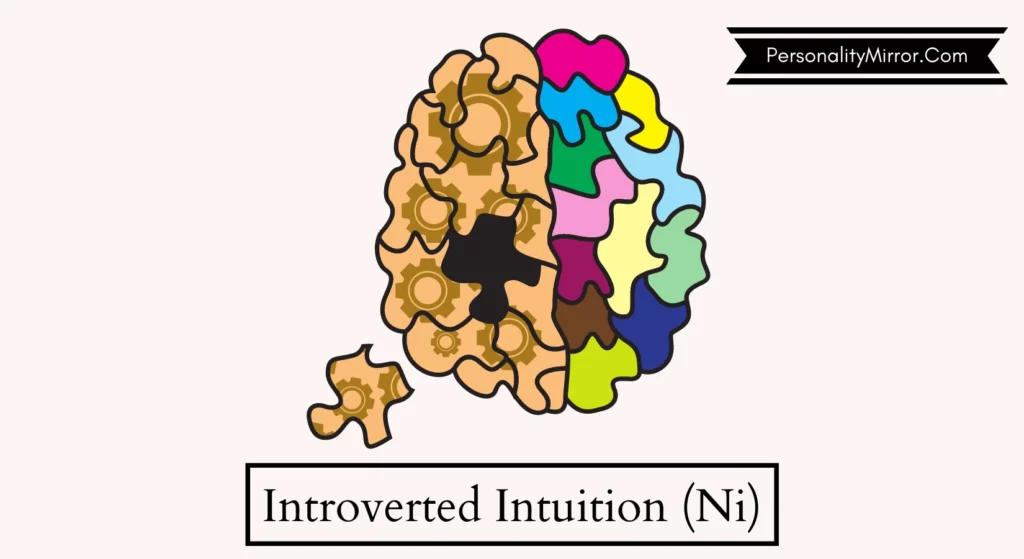
What is Introverted Intuition?
Introverted Intuition (Ni) is a perceiving function that soaks in all kinds of information, whatever it gets exposure to, and then creates patterns and links between them to form a coherent image and a deeper level of meaning behind everything.
As the name suggests, Introverted Intuition(Ni) is a form of Intuition that is Introverted in nature. It means that the nature of this perceiving function is focused inwards. It seeks the missing puzzle piece by looking inside oneself.
Introverted Intuition(Ni) is the mental imagery that runs inside your mind. This mental imagery may include places that you have never been to yet.
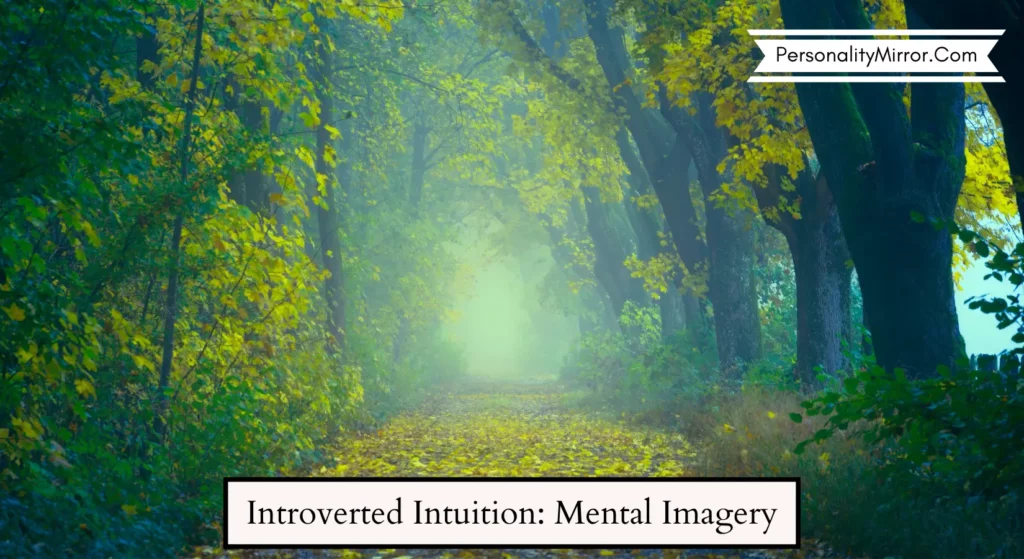
An INFJ whose dominant cognitive function is Introverted Intuition(Ni) lets the INFJ go into a fantasy world by displaying a future vision through images that seem promising. Also, it warns the INFJ of future adverse events by displaying disturbing images that no one would like to experience in reality.
Introverted Intuition(Ni) is closely related to symbolism. It always looks for meaning behind symbols, words, events, and everything they come across. Basically, Intuitive perception is about perceiving everything apart from the sensing perception. Apart from these data, whatever information you perceive through senses, all other information is perceived through our Intuitive functions.
Introverted Intuition (Ni) works by synthesizing data obtained by other perceiving functions and considering the minute decisions made by our judging functions. Using this information, Ni creates the big picture and delivers more profound insights into something while working subconsciously in the brain without your conscious knowledge.
Visual Example of Introverted Intuition(Ni)
Introverted Intuition (Ni) has visual characteristics, and any Ni user (specifically those who have Ni in their primary function stack) can experience the pattern recognition within themselves. Here is the following example of how Introverted Intuition (Ni) manifests visually.
In the above video, you can notice how the tiny particles (the bits and pieces of information) eventually connect to form long chains of more prominent noticeable patterns (the big picture).
You can find another visual representation of Introverted Intuition (Ni) in the following video, where it creates a tree-shaped pattern(Overall meaning and conclusion at the top of it) by connecting the dots (i.e., data, events, and information).
Role of Introverted Intuition(Ni) in the INFJ personality type
Introverted Intuition(Ni) plays the role of Hero or dominant in the INFJ function stack. Out of all the 8 INFJ cognitive functions, it plays the leading role and is used in conjunction with all the other INFJ cognitive functions.
Introverted Intuition (Ni) is the cognitive function behind the so-called magical foretelling powers of the INFJ personality type. As an INFJ, I don’t consider that we have some magical powers or such like that. But, when Introverted Intuition (Ni) kicks in, it starts to dive deep by absorbing every bit of relevant detail it can find. It formulates and comes up with the best accurate insights that we and other types find helpful.
But, the secret sauce for INFJs to learn is that the Introverted Intuition (Ni) works on the amount of information. The more information you have, the better predictions you will make. But don’t go overboard collecting more and more details while looking for the perfect answers, as it will get you trapped into the INFJ Ni-Ti loop.
Introverted Intuition (Ni) plays the role of dominant/Hero, which means that the judging functions most preferably use the data and insights provided by this perceiving function to make decisions by the INFJ.
Now that you have known about the role of Introverted Intuition(Ni) for the INFJ personality type, we will discuss its strength, weakness, and the overall impact it plays on the INFJ personality.
Strength, Weakness and Overall Impact of Introverted Intuition(Ni) in the INFJ personality type
INFJs are the perceiving-dominant types since the dominant cognitive function of the INFJ personality type is led by a perceiving function that is Introverted Intuition(Ni). It plays the ‘Hero’ role and thus has the most powerful impact on the INFJ personality.
Let’s discuss the strength and weaknesses of Introverted Intuition(Ni) for the INFJ personality.
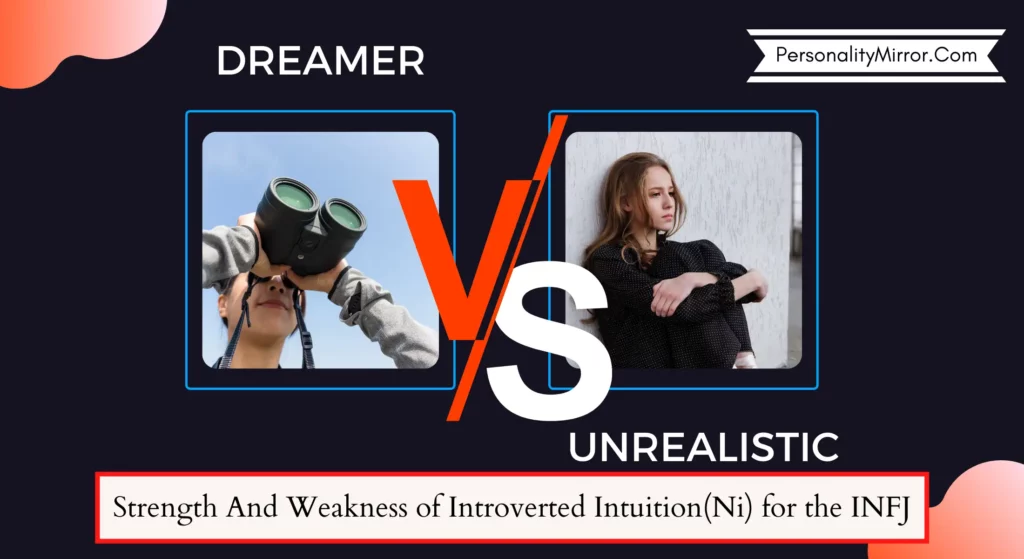
Strength – Makes you a Dreamer
Introverted Intuition(Ni) makes the INFJ Dreamer. INFJs are future-oriented as their Hero Ni always looks for the best future possibilities. It provides INFJs the hope of getting over their past and starting something new irrespective of their contradicting present realities.
Introverted Intuition(Ni) inspires the INFJ by displaying images of personal victory and success. As it receives the intuitive cues, it starts forming a projection of the future events that haven’t taken place yet. The Ni vision actively supports future events that seem impossible from a sensing perspective.
Weakness – Makes you Unrealistic
Over-relying on Introverted Intuition(Ni) makes the INFJ unrealistic. When INFJs stay in the realm of Ni perception, they tend to lose the sense of reality by ignoring their sensory perception through Extraverted Sensing(Se), which we will discuss later in detail. So, the dreams projected by Ni may not get fulfilled if the INFJ loses track of their present self.
When INFJs tend to over-rely on their dominant Ni, they tend to become unrealistic, and it causes a massive amount of stress.
What is the overall impact of Introverted Intuition(Ni) in the INFJ personality?
There is a common favorite question that INFJs often ask – “Why?” The complex answers to this question are provided by their dominant Introverted Intuition (Ni), as it sends the ground research data and deep insights to its primary judging functions Extraverted Feeling (Fe) and Introverted Thinking (Ti) to come to conclusions.
Introverted Intuition (Ni) maps out the big picture, displays how everything is related to each other, and explains each element’s significance, thus developing a thorough understanding of the subject matter.
While dealing with problems, INFJs have the advantage of zooming in on their detailed picture created by their dominant Introverted Intuition (Ni). As a result, it becomes easier for the INFJ to troubleshoot and look deeper into things that are hidden on a superficial level.
INFJs can focus intensely on their distant targets and transform their intuitive abstract dreams into a never seen before reality. It is because Introverted Intuition (Ni) is convergent in nature, and it becomes powerful with a continued focus similar to how the sun rays converge through a magnifying glass, becoming inflammable enough to ignite a piece of wood or a piece of paper where it lands.
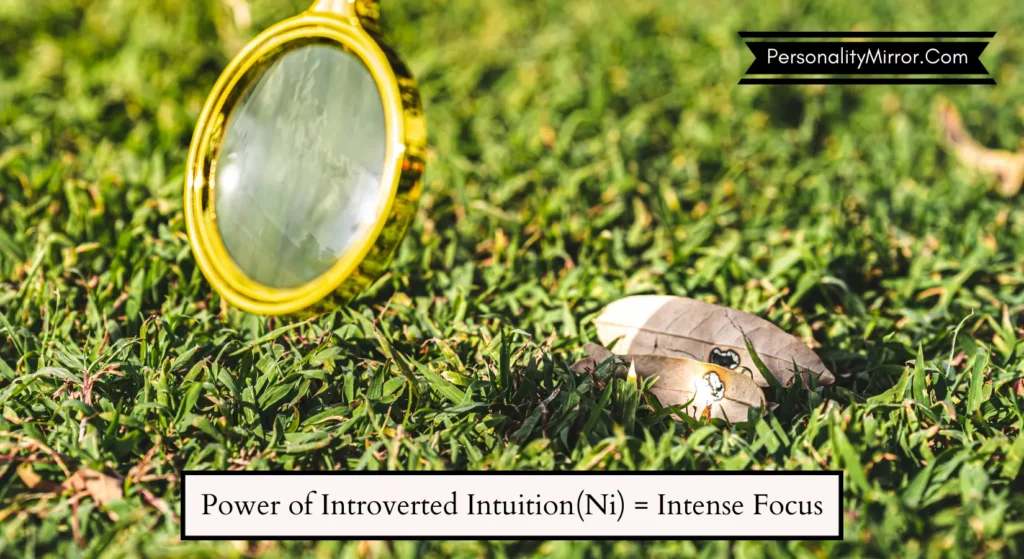
It is common for INFJs to come across epiphanies, and Aha! Moments where they get amazed by their experiences of sudden realizations. Introverted Intuition (Ni) works continuously subconsciously behind the scenes and keeps delivering sudden insights about things that they may not be thinking about at the moment.

Extraverted Intuition (Ne)
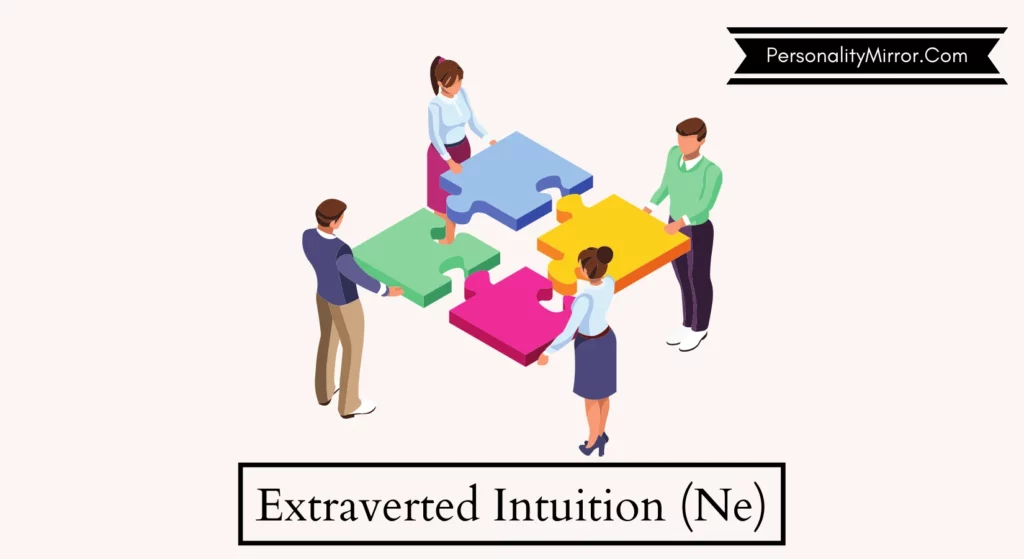
What is Extraverted Intuition(Ne)?
Extraverted Intuition is a perceiving function that helps one brainstorm random theoretical possibilities and come up with multiple options while looking for a solution.
As the name suggests, Extraverted Intuition (Ne) is extraverted in nature. It means that the nature of this perceiving function is focused outwards. It seeks the missing puzzle piece by looking outside of oneself.
One uses the Ne perception to solve their problems by connecting events, people, and external objects. It allows one to focus upon what can be possible in the world.
Extraverted Intuition (Ne) is responsible for envisioning new ideas, entertaining random prospects, and enabling new possibilities.
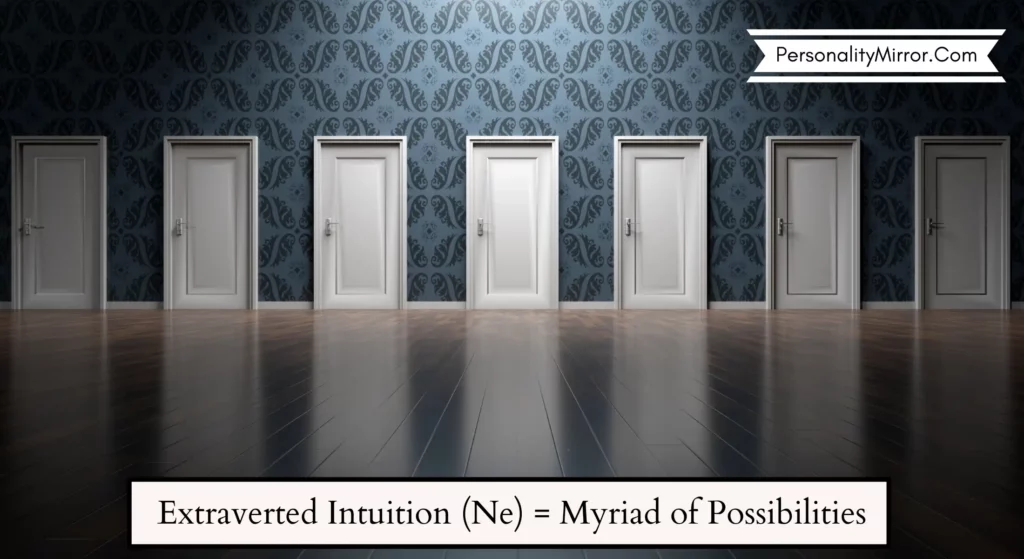
Visual Representation of Extraverted Intuition (Ne)
The Extraverted Intuition (Ne) connects ideas, events, people, and random things to find solutions. Once the Extraverted Intuition(Ne) builds the perceptive network, it sends this information to the judging functions to make necessary decisions. Makeshift ideas are the creation of this cognitive function.
Role of Extraverted Intuition(Ne) in the INFJ Personality Type
Extraverted Intuition (Ne), being a shadow function, plays an active role in the unconscious mind of the INFJ personality type. Thus, its conscious presence is seldom felt by INFJs. But it plays a considerable role and indirectly influences the whole personality.
Extraverted Intuition(Ne) plays the role of Opposing personality, bringing frustration and challenge to the INFJ. It opposes seeking new possibilities that can be beneficial to the INFJ. It seduces the INFJ with random distractions and derails them from following their set vision.
The strong opposition made by the opposing Extraverted Intuition (Ne) confuses the INFJ greatly, weakens their action-taking abilities, and makes them doubt their strong Intuition.

Extraverted Intuition (Ne) doesn’t only play the Villain role, but it also supports and acts as a strong backup when a danger is perceived in the conscious mind. Let’s discuss the strength, weaknesses, and overall impact of Extraverted Intuition(Ne) in the INFJ personality type.
Strength, Weakness and Overall Impact of Extraverted Intuition(Ne) in the INFJ personality type
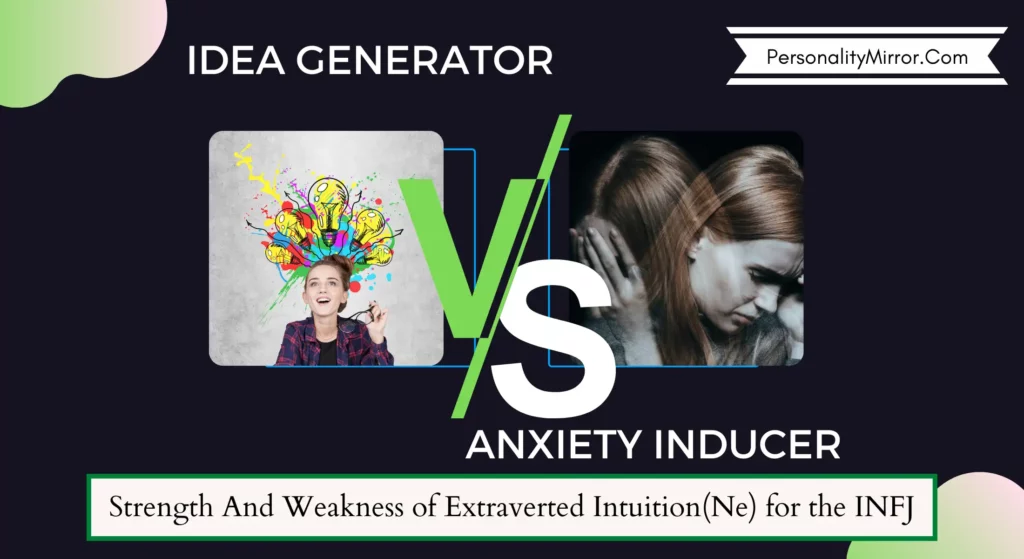
Strength – Makes you an Idea Generator
Extraverted Intuition (Ne) offers you a myriad of possibilities. It acts as a random Idea generator. It’s the greatest strength that Extraverted Intuition (Ne) contributes to an INFJ. Though it plays a self-critical approach in framing the possibilities, it helps the Ni dom refine its vision and prepare for all the negative probabilities.
It also allows the INFJ to envision success and manifest their dreams. Unlike the primary Ne users who are comfortable enough to envision new possibilities, INFJs find it difficult to imagine something they have no idea about. With the help of a Ne dom (ENFPs and ENTPs) or a Ne parent (INFPs and INTPs), it becomes much easier for INFJs to tap into this function, enable and align their envisioning capabilities.
Weakness – Induces Anxiety
Anxiety is one of the major weaknesses that the opposing Extraverted Intuition (Ne) offers to the INFJ personality type. Anxiety is the fear of something undesirable that can happen in the future. Someone suffering from anxiety frequently considers the pessimistic possibilities that can occur in the future. When INFJs suffers from anxiety, the opposing Extraverted Intuition (Ne) shows the dark undesirable events that can take place in their life.
And it becomes difficult for an INFJ to tap into their unconscious mind and turn off the negative chatter. When the resulting anxiety goes unaddressed, it not only prevents you from finding meaning in life but also harms your mental and physical well-being.
What is the overall impact of Extraverted Intuition (Ne) in the INFJ personality type?
INFJs can simultaneously maintain multiple parallel perspectives on a singular thing, and they’re quick enough to change perspectives when required. Extraverted Intuition (Ne) coupled with Introverted Intuition (Ni) makes it possible. Here Ne is used for ruling out the possibilities that are not required.
In difficult times, when you lose hope and things look impossible, Ne helps you take charge of yourself by showing you a bright picture. It tries to convince you that there is a possibility, even when things look dark and gloomy.
But this mode gets activated only when you’re in danger or a stressful situation. Otherwise, it usually plays a self-critic role while envisioning possibilities.
When no restraint is put on the Ne opposing personality, it makes you hop from one idea to another. And since it plays the opposing role, it will never let you find the permanent solutions your Ni dom seeks eventually. Instead, it will seduce you towards new possibilities that distract you from your goals and your long-term vision set by your Ni dom.
Use Ne to rule out possibilities. Ne will naturally try to divert you from your natural path progression. Use Ne (new possibilities) only when it supports your existing vision (ideated by Ni dom). The key to healthily using Ne is to strike a healthy balance between staying open to new possibilities and staying focused on your existing processes and goals.
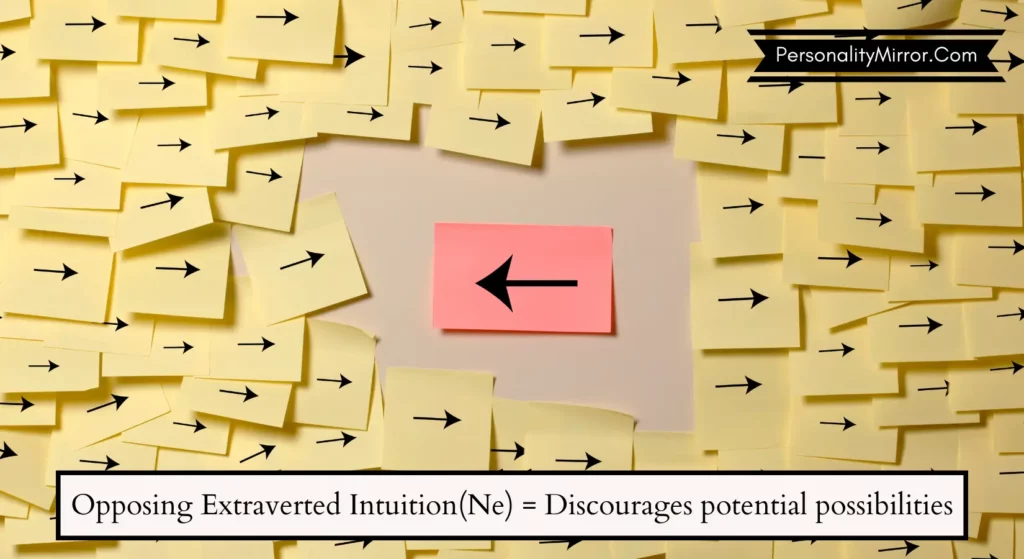
Extraverted Sensing (Se)

What is Extraverted Sensing (Se)?
Extraverted Sensing (Se) is a perceiving function that absorbs tangible objective information from the world by engaging its five senses. Extraverted Sensing (Se) helps you stay aware of your present and keeps you in tune with your surroundings.
Extraverted Sensors love enjoying physical experiences. It aims to understand the world around them by gaining more physical experiences. It learns and gathers information by experimenting with things and trying its hands out before learning it through theory.
Extraverted Sensing (Se) users, especially the Se doms (ESTPs and ESFPs) and Se parents (ISTPs and ISFPs), thrive on risks and appreciate physical aesthetics.
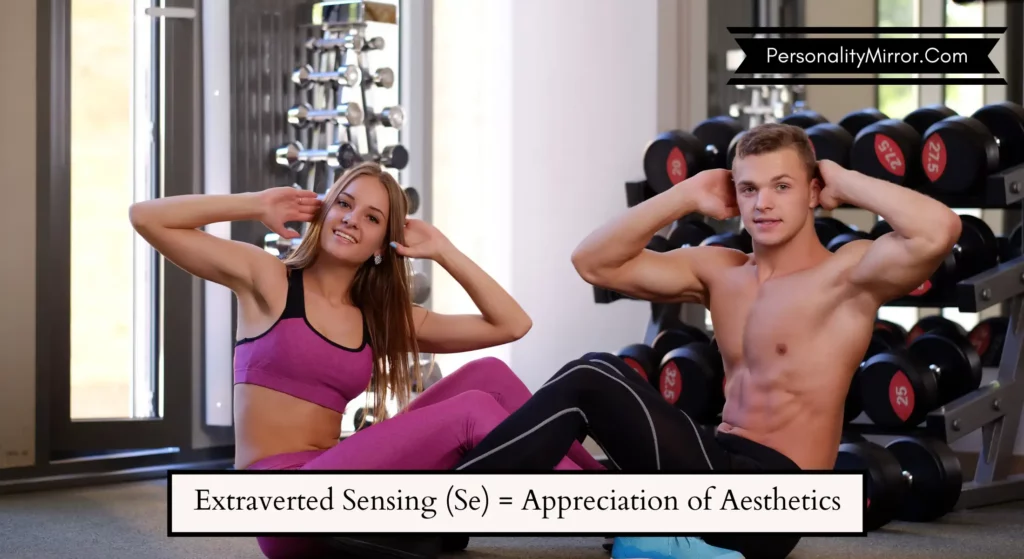
Role of Extraverted Sensing (Se) in the INFJ personality type
Extraverted Sensing (Se) is one of the primary INFJ cognitive functions, and it plays the inferior/aspiration role in the INFJ personality. Extraverted Sensing (Se) is also known as the Anima/Animus for the INFJ personality type.
Extraverted Sensing (Se) is an inferior perceiving function than the dominant Introverted Intuition (Ni) that the INFJ often relies upon to navigate life. However, since Extraverted Sensing (Se) is one of the primary INFJ cognitive functions, its presence is actively felt in the conscious mind by INFJs.
But it’s the least conscious INFJ cognitive function of the primary function stack, and it becomes difficult for INFJs to tap into this function and make full use of it. This function is also known as the gateway to the unconscious.
Extraverted Sensing (Se) plays a crucial role in the growth and development of the INFJ personality type. Let’s discuss its strength, weaknesses, and overall impact on the INFJ personality type.
Strength, Weakness and Overall Impact of Extraverted Sensing(Se) in the INFJ personality type
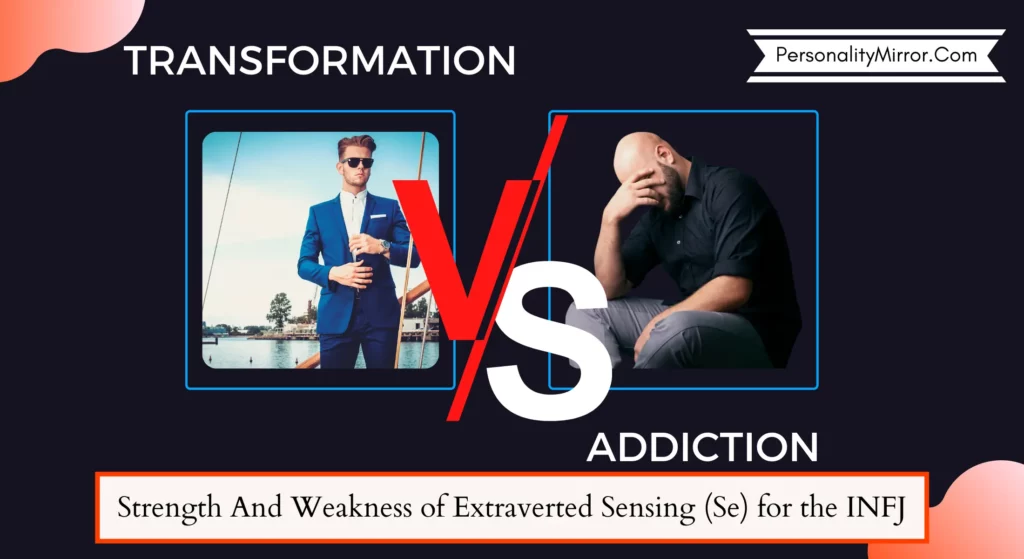
Strength – Transformation
Extraverted Sensing (Se) is the key INFJ cognitive function that breaks or transforms the INFJ personality type. INFJs are naturally weak while tapping into Extraverted Sensing (Se). It’s the reason why INFJs take more time to process real-time events and overthink when it comes to taking physical action.
There’s nothing to feel embarrassed about it, and it’s totally unhealthy to compare your natural physical abilities with the Se doms and Se parents. Weak Se is the ultimate weakness of the INFJ personality type. Once you accept it, you can start working upon it and develop it steadily through regular practice.
The best thing about the inferior Extraverted Sensing (Se) is that it has an aspiring characteristic which Se doms and Se parents don’t have. On the contrary, INFJs have an aspiration to bend their reality and make a massive impact in the real world.
Every INFJ who has become successful in their life was able to change their reality by transforming themselves and eventually transforming the people and the world around them. Therefore, transformation is something that an INFJ always looks for because deep within them, they know they have the aspiration and the ability to transform their reality.
Weakness – Addiction
INFJs have an intense need for physical stimulation. Other personality types also have. But the key difference to note is that INFJs learn and evolve by engaging this perceiving function. When they can engage their Extraverted Sensing (Se), they get an accurate perception of reality by matching it with their intuitive perception. So, physical engagement is crucial for the INFJ to grow and develop themselves.
When INFJs don’t have a clear vision, fail to find meaning in life, and experience directionlessness, they look for indulging in physical pleasures that offer short-term gratification to their senses. INFJs may seek physical pleasure by getting addicted to sex, drugs/alcohol, cleaning, playing video games, and food.
While staying addicted for more extended periods, INFJs find it hard to make sense of their reality. As a result, they start sabotaging their physical and mental well-being. And they stop engaging in healthy physical activities that can bring a positive change in their lives. Over time, INFJs start developing anxiety, leading to depression and panic attacks later when they fail to check their growing addictive behaviors.
What is the overall impact of Extraverted Sensing (Se) in the INFJ personality type?
Every 16 Myers-Briggs personality type has a sensing function in their primary cognitive function stack. Either it’s Introverted Sensing (Si), or it’s Extraverted Sensing (Se). For INFJs, Extraverted Sensing (Se) is the primary cognitive function, and thus, they have more conscious control over it than the shadow Introverted Sensing (Si) function.
For every Extraverted Sensing(Se) user, it’s easier for them to embrace new physical experiences than the Introverted Sensing(Si) users. For INFJs, Se helps to perceive reality, stay in touch with their physical selves, stay grounded, and understand the need of the hour.
If you’re an INFJ, you must engage yourself in healthy physical activities to help you familiarize yourself to tap into this function efficiently. Actively engaging your Extraverted Sensing (Se) is the key to your dream life. You have gazillion dreams floating in your mind. If you want to manifest any of them, you have to finally use this function to transform your INFJ dreams into reality.

Introverted Sensing (Si)
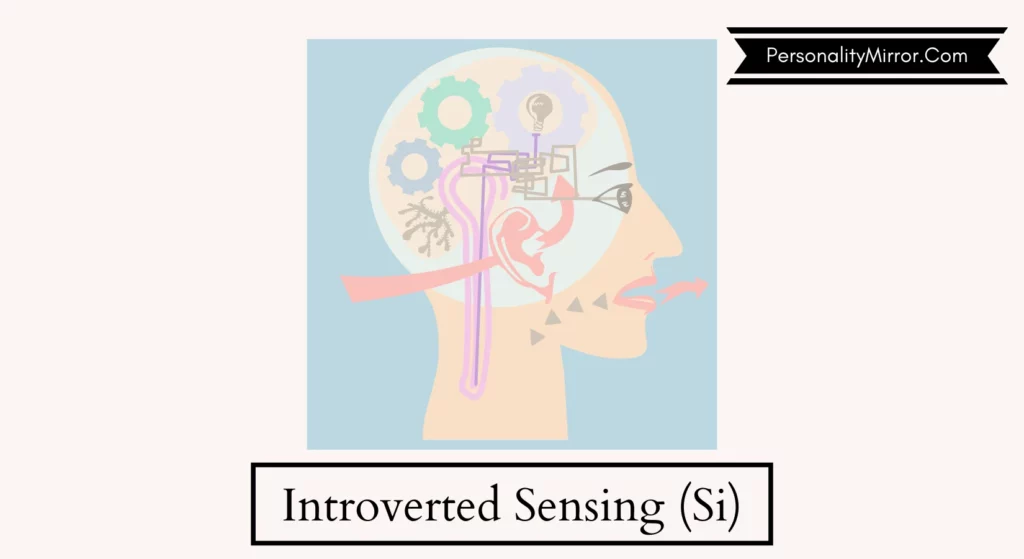
What is Introverted Sensing (Si)?
Introverted Sensing is a perceiving cognitive function about what you sense within yourself without any external event’s direct influence. So, for example, when you feel hungry, thirsty, sleepy, sense of tingling, internal pain, rise in body temperature, urge to pee and defecate, etc., you’re tapping into your Introverted Sensing (Si) function.
Introverted Sensing (Si) also perceives data by recalling the memories of your five senses that were gathered from your past events. So, for example, while you recognize the odors, sounds, taste, visuals, and skin touch sensations from your past incidents, you’re engaging Introverted Sensing (Si) to get these sensing details.

Introverted Sensing (Si) develops its internal sensing database by recording and memorizing the sensory data collected by the Extraverted Sensing (Se) function. Introverted Sensing (Si) helps you compare the real-time sensory details with the similar past sensory details obtained from your subjective life experiences.
Introverted Sensing (Si) users, especially the Si doms(ISFJs and ISTJs) and the Si parents(ESTJs and ESFJs), actively use Introverted Sensing (Si) as their primary perceptive function to gain an understanding of the world.
Role of Introverted Sensing (Si) in the INFJ personality type
INFJs have Introverted Sensing(Si) as a shadow function playing the demonic role in their unconscious mind. Since Introverted Sensing(Si) plays a demonic role, INFJs tend to undermine the insights and data provided by this perceiving function.
Though INFJs undermine and deliberately ignore the insights given by Introverted Sensing (Si), the influence played by this cognitive function on the INFJ personality is huge. It’s powerful enough to dominate all other INFJ cognitive functions and challenges the dominant Introverted Intuition (Ni) insights. As a result, a tug of war often ensues between Introverted Sensing (Si) and Introverted Intuition (Ni), resulting in severe stress for the INFJ personality.
Strength, Weakness and Overall Impact of Introverted Sensing(Si) in the INFJ personality type
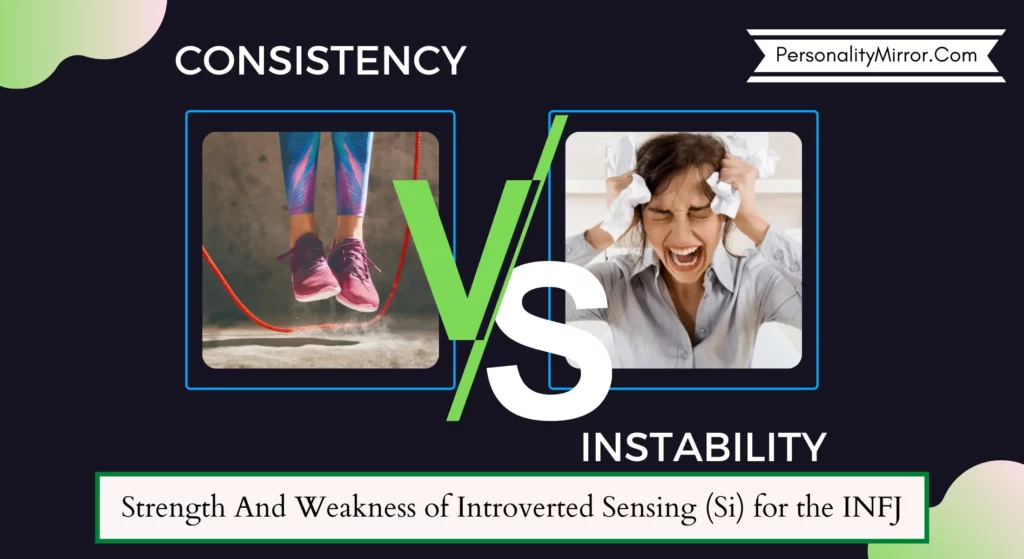
Strength – Consistency
The biggest strength that Introverted Sensing (Si) provides is consistency. Consistency is the key to maintaining discipline and healthy habits in life. Introverted Sensing (Si), when used correctly, helps you keep doing the same thing in the same manner without requiring much conscious effort. It’s the reason why Si users love to follow routines and traditions that they’re familiar with.
INFJs are naturally not inclined towards the idea of repetition. INFJs being the Se aspirationals love novelty. But, to succeed in life, one needs to build consistency in maintaining a healthy daily routine. And it requires one to repeat the same sensing activities that look boring and intuitively exhausting to the INFJ.
If INFJs don’t consciously build healthy habits, they are destined to stay stuck forever in life. INFJs need to intentionally focus upon Introverted Sensing (Si) and use its heavy influence to carry forward their intuitive vision in a positive and appreciative manner.
Weakness – Instability
As stated earlier, Introverted Sensing (Si), when unattended, tends to play a demonic role in the INFJ personality. It brings a lot of instability and unrest in the normal functioning of the INFJ personality type.
For example – It’s pretty natural for INFJs to skip meals, stay awake at night without feeling sleepy, not care about their physical bodies, and indulge in activities that involve self-neglect. INFJs won’t hesitate to break their healthy routine, unlike the healthy primary Si users.
While aspiring for novelty in the form of physical pleasure or overthinking in the pursuit of epiphany, INFJs tend to totally ignore the Si insights, which result in instability and severe stress down the line.
What is the overall impact of Introverted Sensing (Si) in the INFJ personality type?
Driven by their dominant Introverted Intuition (Ni), INFJs tend to live in the future while discarding their present life assets and liabilities. Therefore, it requires healthy introspection and looking into the tangible sensing data to realize the current condition of an INFJ.
Comparing your present self with your past through actual data requires you to engage in Introverted Sensing (Si) actively. If you don’t look back at how far you have come and how much you have achieved over the years in real terms, you would never be able to feel gratitude in life. So start celebrating your achievements and realize the importance of your current well-being in all spheres of your life.

INFJs are ambitious, and they feel complacent to celebrate their past tangible victories. But doing so will only make them realize how much success they have achieved over the years and how much they have neglected their well-being to live in the tomorrow and not relish the present moment.
Start comparing your present with your old self in a healthy way, and you will easily be able to conquer your Introverted Sensing (Si) demon.
Conclusion
In this post, we discussed the perceiving INFJ cognitive functions starting from Introverted Intuition (Ni), Extraverted Intuition (Ne), Extraverted Sensing (Se), and Introverted Sensing (Si). In addition, we discussed the roles, strengths, weaknesses, and the overall impact each INFJ cognitive function played in the INFJ personality type.
In the next post, we will discuss the judging INFJ cognitive functions, which are used for calculating and making decisions. I hope you found some clarity on perceiving INFJ cognitive functions from this post.
Please share your honest thoughts, opinions, and learning experiences in the comments below. I will hugely appreciate it. Also, if you have any doubts about INFJ cognitive functions, do let me know.
If you enjoyed this post, don’t forget to check these!
The 4 Judging INFJ Functions: A Meaningful Comprehensive Understanding
